What is A Neurologist?
A neurologist is a consultant doctor who specialises in the diagnosis and management of neurological symptoms and conditions. Each neurologist who has trained in the UK has undergone a long and rigorous period of training. This is very important because the specialty of Neurology is an especially broad one, covering many aspects of human conditions, some common, some very rare and complicated. A neurologist must keep up to date in every aspect of their practice our knowledge of neurological disease is advancing rapidly.

Neurological symptoms
The following are symptoms that you may have experienced. A neurologist is the specialist who is called upon to assess these symptoms, although some are also assessed by other specialities.
-
Dizziness, lightheadedness, unsteadiness, disequilibrium, giddiness, vertigo
-
Blackouts, faints, funny turns, fits, seizures, convulsions
-
Headaches, migraine, neuralgia
-
Weakness, paralysis, muscle wasting
-
Numbness, pins and needles, tingling, burning, pain
-
Involuntary movements, jerks, twitching, tremor, shakes, spasms, clumsiness
-
Slowing up, stooping, shuffling gait, staggering, altered speech, altered swallow
-
Fluctuating vision, transient blindness, double vision, hemianopia
-
Dementia, forgetfulness, confusion, delirium, disorientation
Neurological Conditions
These are some of the more common conditions or syndromes in Neurology:
-
Migrainous dizziness, benign paroxysmal positional vertigo (BPPV), labyrinthitis, phobic dizziness, hyperventilation
-
Postural dizziness, vasovagal syncope, reflex hypoxic myoclonus, seizure, epilepsy
-
Episodic migraine, chronic migraine, cluster headache, paroxysmal hemicrania, hemicrania continua,
-
SUNCT/SUNA, temporal arteritis, trigeminal neuralgia
-
Root entrapment, peripheral neuropathy, small fibre neuropathy, mononeuritis, motor neurone disease, myasthenia gravis, myopathy
-
Carpal tunnel syndrome, ulnar nerve entrapment, common peroneal nerve entrapment, meralgia parasthetica, Bell’s palsy
-
Cerbellar ataxia, Essential tremor, Parkinson’s disease, multiple systems atrophy (MSA), progressive supranuclear palsy (PSP), dyskinesia, chorea, dystonia, restless legs syndrome
-
Multiple sclerosis, optic neuritis, internuclear ophthalmoplegia, oculomotor palsy, transverse myelitis, spasticity
-
Alzheimer’s disease, vascular dementia, Lewy body dementia, fronto-temporal dementia, subjective memory symptoms
Neurological Investigations
MRI brain or spine
Modern MRI techniques make an invaluable contribution to neurological diagnosis, clarifying aspects of anatomy in exquisite detail and excluding secondary, structural causes of some neurological symptoms. If a patient requires structural imaging of a part or parts of their nervous system, it can be arranged promptly. All the hospitals that Dr Mort works at own their own up-to-date MRI machine. Once acquired, the relevant imaging is reported by expert neuro-radiology consultants that day. The images should be available for review in the clinic room at the time of follow-up consultations. Supplementary techniques include MR angiography (MRA), CT angiography (CTA) and MR venography (MRV).
Nerve conduction studies / EMG
Nerve conduction studies / EMG is a technique which tests the electrical properties of the patient’s nerves and muscles to try to localise the level at which there is a pathological change. The test does not take long and is performed by a consultant clinical neurophysiologist who is expert in interpreting the data obtained.
EEG (electro-encephalography)
EEG is a standard technique for measuring the spatial and temporal distribution of electrical activity across the surface of the brain. Its principal use is to provide supporting information in the diagnosis of epilepsy. In itself though it does not diagnose epilepsy (unless performed whilst a seizure is happening). That is diagnosed from the clinical history. Indeed a significant number of patients with clinical evidence of a definite diagnosis of epilepsy will have relatively normal EEGs between attacks, so it cannot be used to ‘exclude’ epilepsy, for example.
A variety of other tests may be organised by Dr Mort if clinically indicated, including blood tests, ECG, 24 ECG, chest xray, echocardiogram, carotid doppler’s, CT body scanning, whole body PET, DAT scan
Appointments & FEES
Patients consulting me should always have been referred with a letter by their GP or by another consultant practitioner. For obvious reasons, I will insist that my clinic letter goes to the GP and that they are kept fully in the picture at all stages.
A copy of my clinic letter to the GP (or other referrers) will be sent to the patient’s preferred contact address (including their email address, if requested), unless the patient has requested not to receive a copy.
I am registered as a provider with every major medical insurer. Insured patients should contact their insurer to obtain an authorisation code prior to a consultation with me and it is advisable that this is provided at the time of booking the appointment. Sometimes, insurers only cover a proportion of the consultation fee. If this is the case, the patient must recognise that, in consulting me, they are agreeing to pay promptly any shortfall not covered by their insurer as soon as they or we notify them of a shortfall.
FEES
Initial Consultation
Follow-Up
I regularly see self-funding patients as well. Self-funding patients are requested to pay the consultation fee in advance by card over the telephone or by BACS transfer via my secretary.
Please be aware that any diagnostic tests (including blood tests and scans) are not included in my fee and would be invoiced separately by the provider.



